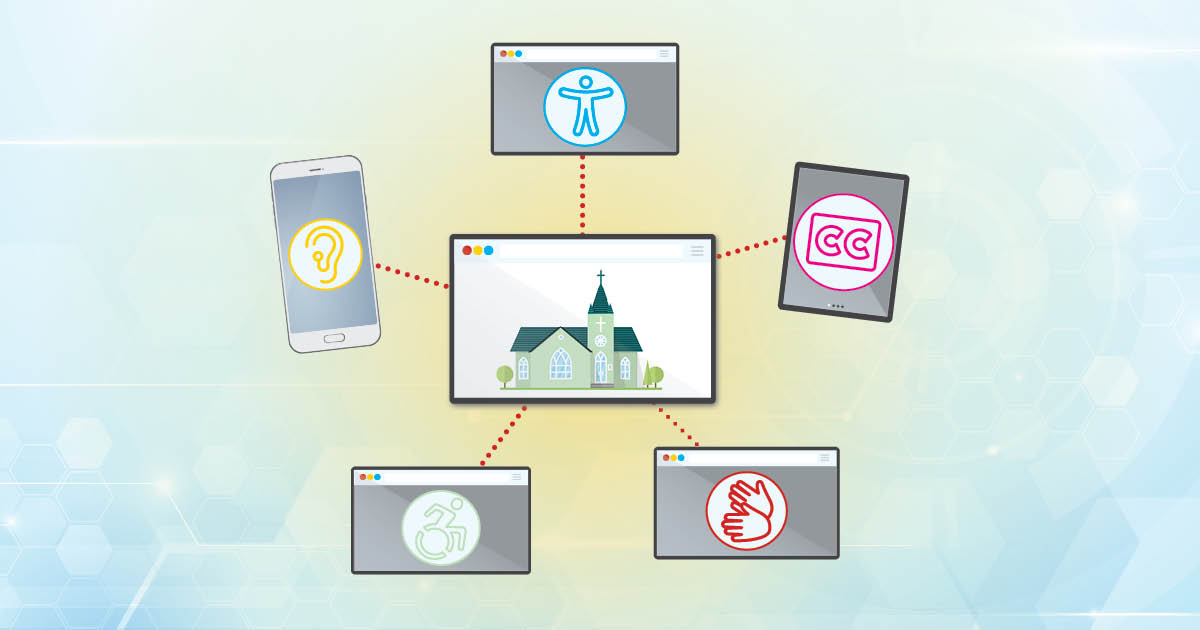In January, Anglican priest Tish Harrison Warren wrote that it was time for churches to drop their online services in an opinion column for the New York Times. She pointed to the need for embodied community and argued that continuing to offer church online turns this central practice into a consumer preference. Salvationist.ca asked Salvation Army officers Major Christine Johnston, Major Shelley Kerr and Lieutenant Rick Apperson—the first two with experience in ministry to those with disabilities, and the third, a corps officer—for their thoughts.
Hello, Majors Christine and Shelley,
I recently read a New York Times opinion piece titled “Why Churches Should Drop Their Online Services,” by Anglican priest Tish Harrison Warren. I couldn’t help but notice that while she made some salient points about the need for community and the importance of gathering, she seemed to miss the bigger picture entirely.
I agree that we have lost something when it comes to community during the pandemic. Some have cited Hebrews 10:25 as a reason not to abandon meeting in person: “Some people have given up the habit of meeting for worship, but we must not do that. We should keep on encouraging each other, especially since you know that the day of the Lord’s coming is getting closer” (CEV).
As a church, we have missed strengthening, connecting and sharing life with others. There is something to be said for worshipping together as a body—sharing in song, encouraging and edifying one another in the Word of God.
In community, we can be present with people in their grief and walk with those who are feeling lonely. Statistics show that our mental health has suffered because of not being able to meet and share in worship and fellowship together. The benefits of community have been dampened as we have been unable to meet in person, and online church has been a pale substitute. However, I think there are benefits in continuing to offer online services as we return to in-person gatherings. I know you are both actively involved in ministry with people with disabilities, and I would love to hear your thoughts on this.
—Lieutenant Rick Apperson
Hello, Lieutenant Rick and Major Shelley,
Thank you for your reflections on the New York Times article, Lieutenant Rick. You bring up some excellent points about the benefits of meeting together in person for worship, as does the author. But her suggestion that we completely do away with online church services seems off base.
Since the introduction of virtual services in response to the pandemic, there are people who were previously marginalized who are now able to view and participate in church. The author suggests that those who cannot attend in-person church services should be visited within their own home for fellowship, prayer and spiritual direction. This is needed, but they are still shut out from being part of the larger faith community.
Imagine a person with such disabling social anxiety that they cannot attend church. They may benefit from a visit to their home, but it might not be a weekly occurrence because of scheduling and time constraints. But if that person can connect virtually each Sunday, it will keep them engaged with the congregation, which could lead to attending in person. Even seeing the church facility—the sanctuary, the leaders, the musicians—can offer a level of comfort about attending in person.
The author of the article suggests that online worship will make church seem like an elective rather than a necessity for the committed Christian—but there will always be people who think going to church is optional, whether it is virtual or in-person. Gathering together for worship, whether physically in a building or together in spirit, allows all of God’s people to be part of community.
—Major Christine Johnston
Hello, Lieutenant Rick and Major Christine,
This is such a great conversation. I haven’t been a corps officer during the pandemic, but I’ve certainly been grateful for how they stepped into the overwhelming task of online worship. From what I have seen, the complexity of all that is required seems exhausting. I can only imagine that the thought of dropping the online component would feel like a huge weight being lifted. But I have also observed the blessings the true body of Christ has received because of meeting online.
Some people face obstacles to physically attending church and online services removed those obstacles. I have heard from many who have felt connected to the church for the first time in a long time, or who are grateful that others now understand what it is like for those who cannot attend an in-person gathering. The pandemic has given us all an opportunity to re-evaluate how the body of Christ connects.
Dare I say that our pre-pandemic church was not inclusive? I am reminded of Catherine Booth’s words: “If we are to better the future, we must disturb the present.” COVID-19 disturbed us, all of us. As difficult as it has been, God’s people have been given an opportunity to gather in a new way. My prayer is that we allow our disturbance to keep our hearts open to embrace the community of all of God’s family.
—Major Shelley Kerr
Hello, Majors Christine and Shelley,
Thank you both for sharing your thoughts about this article. You’ve brought up great points about the obstacles that can prevent people from attending in-person services and the potential of online worship. This has given me much food for thought.
I know some churches are dropping their online services completely and that concerns me for some of the reasons you cited. For those with mental and physical health challenges, losing access to church is not something we should take lightly. Could we return to in-person services while continuing our online presence?
Technical issues would have to be addressed to bring the best of both worlds into play. In our corps, we have some people who like to play the tambourine. Based on the location of the camera, this could come across quite loudly online and possibly interfere with someone listening to the music. How do we honour both those attending in person and those online?
This is where I think the impact of consumerism could be felt, as people may click away if the service is of poor technical quality, thus defeating the purpose of maintaining an online presence. I believe that we, as a church, should commit to addressing these challenges, working with our congregations to ensure in-person participation, while also allowing those at home to enjoy services as well. Some technical training for staff and volunteers may also be needed. What do you think?
—Lieutenant Rick Apperson
Hello, Lieutenant Rick and Major Shelley,
I believe you have both captured one major challenge. When virtual communication was first needed, almost overnight at the beginning of the pandemic, everyone was scrambling to learn the technology and for many leaders it was a steep learning curve.
There are so many details to manage when offering virtual worship services and many of our churches just don’t have the required equipment or volunteers with the necessary skills. Maybe we need to ask ourselves—is it worth it? But let’s press the question a little deeper—is it worth the time and effort to make church accessible to all people? Is it worth the time and effort to make Jesus accessible?
Look at the story of the paralyzed man found in Mark 2. What would the outcome have been if the men who were carrying their friend looked at the crowd blocking the doorway to Jesus and decided they couldn’t get through, and turned around and went home? It’s not only the paralyzed man who would have missed out—his friends’ faith would not have been strengthened and the crowd would not have witnessed both a spiritual and physical healing. Jesus would not have had the opportunity to teach about his authority over sin. Was it worth it for the friends to risk the precarious climb up to the roof, the time to dig through it or the effort to lower the man down to Jesus?
Is it worth our time, energy, resources and effort to make the message of Jesus accessible to all? If our answer is yes (and if it’s not, we might have a bigger problem), then maybe we do need technical equipment and training. Maybe we need to work together, as the body of Christ, helping each other. Maybe we need to bring everyone we can to Jesus.
—Major Christine Johnston
Hello, Lieutenant Rick and Major Christine,
I’m grateful for this conversation and pray that it’s just the beginning of a dialogue—one that others will join in. What still feels missing are the voices of those who are vulnerable, who have been excluded and have now been included through the shift to online church. Our discussion would be so much richer if we were hearing specifically from those who have lived experience of disability.
I know that for each of us, our desire is for this conversation to go deeper and local, as well as higher and beyond. Let me explain. At the congregational level, we need to start by recognizing that our places of worship can only represent the body of Christ when there is a place at the table for everyone. I encourage everyone reading this to start there. Having a starting point is a huge step.
When we stop and consider who is missing from our churches, who has only been able to be part of the church body because of the shift to online services, then the conversation starts to take shape. Moving on from this, the conversation becomes: What do we, as the body of Christ, need to do or have in place so that all are noticed, known and missed?
If we, as the body of Christ, embrace the belief that accessibility benefits everyone, then it will shape our planning of what worship for all looks like. It shapes our use of space. It shapes the support we need and the resources we require. If we begin to change at the congregational level, then divisionally and territorially we will change.
—Major Shelley Kerr
Lieutenant Rick Apperson is the corps officer in the Bulkley-Skeena Circuit, B.C. Major Christine Johnston is the director of spiritual and religious care at Toronto’s Broadview Village, which provides support and services for adults with developmental disabilities and/or struggling with mental health challenges. Major Shelley Kerr is the divisional corps ministries secretary in the Bermuda Division. She was previously appointed as a chaplain at Broadview Village, and as the spiritual care co-ordinator at Winnipeg’s Community Venture, which supports adults living with intellectual disabilities through residential homes, outreach and day programs.
Illustration: ser_igor/iStock via Getty Images Plus; Culombio/stock.Adobe.com; Lisa Suroso










Thank you Norma for sharing from your heart all that you have been through and the value that you have found in having worship services available online. You articulated everything we were trying to convey in this article. May God richly bless you as you continue pressing into a deeper relationship with Him.